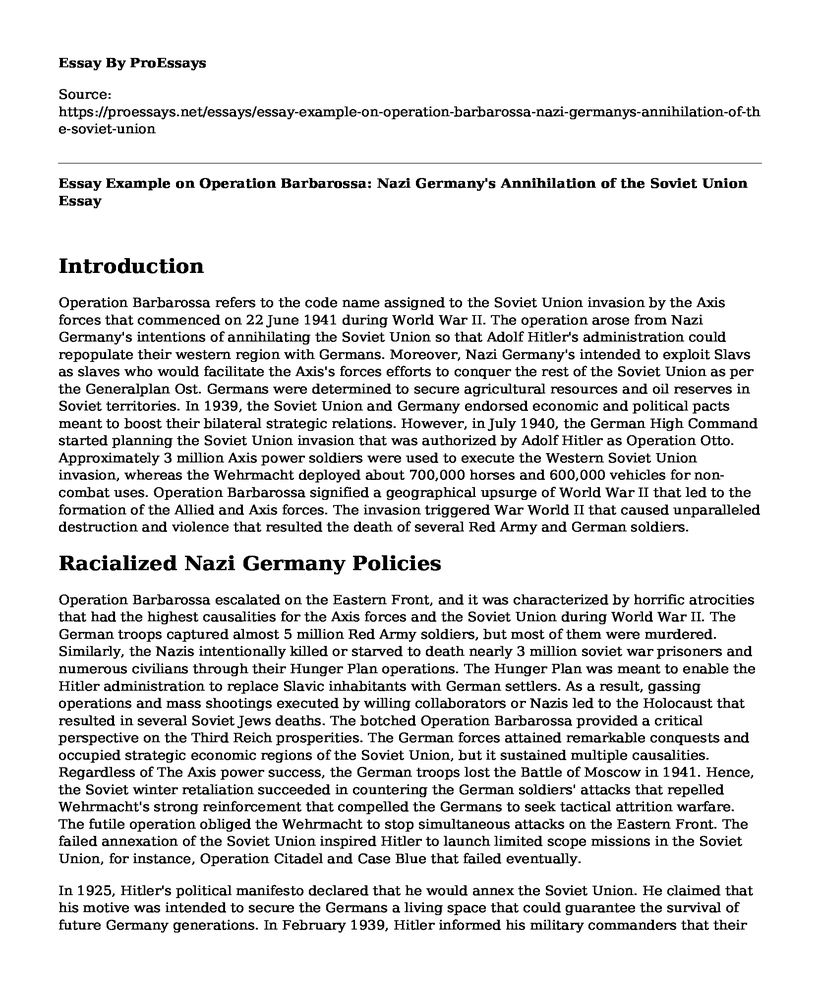Introduction
Operation Barbarossa refers to the code name assigned to the Soviet Union invasion by the Axis forces that commenced on 22 June 1941 during World War II. The operation arose from Nazi Germany's intentions of annihilating the Soviet Union so that Adolf Hitler's administration could repopulate their western region with Germans. Moreover, Nazi Germany's intended to exploit Slavs as slaves who would facilitate the Axis's forces efforts to conquer the rest of the Soviet Union as per the Generalplan Ost. Germans were determined to secure agricultural resources and oil reserves in Soviet territories. In 1939, the Soviet Union and Germany endorsed economic and political pacts meant to boost their bilateral strategic relations. However, in July 1940, the German High Command started planning the Soviet Union invasion that was authorized by Adolf Hitler as Operation Otto. Approximately 3 million Axis power soldiers were used to execute the Western Soviet Union invasion, whereas the Wehrmacht deployed about 700,000 horses and 600,000 vehicles for non-combat uses. Operation Barbarossa signified a geographical upsurge of World War II that led to the formation of the Allied and Axis forces. The invasion triggered War World II that caused unparalleled destruction and violence that resulted the death of several Red Army and German soldiers.
Racialized Nazi Germany Policies
Operation Barbarossa escalated on the Eastern Front, and it was characterized by horrific atrocities that had the highest causalities for the Axis forces and the Soviet Union during World War II. The German troops captured almost 5 million Red Army soldiers, but most of them were murdered. Similarly, the Nazis intentionally killed or starved to death nearly 3 million soviet war prisoners and numerous civilians through their Hunger Plan operations. The Hunger Plan was meant to enable the Hitler administration to replace Slavic inhabitants with German settlers. As a result, gassing operations and mass shootings executed by willing collaborators or Nazis led to the Holocaust that resulted in several Soviet Jews deaths. The botched Operation Barbarossa provided a critical perspective on the Third Reich prosperities. The German forces attained remarkable conquests and occupied strategic economic regions of the Soviet Union, but it sustained multiple causalities. Regardless of The Axis power success, the German troops lost the Battle of Moscow in 1941. Hence, the Soviet winter retaliation succeeded in countering the German soldiers' attacks that repelled Wehrmacht's strong reinforcement that compelled the Germans to seek tactical attrition warfare. The futile operation obliged the Wehrmacht to stop simultaneous attacks on the Eastern Front. The failed annexation of the Soviet Union inspired Hitler to launch limited scope missions in the Soviet Union, for instance, Operation Citadel and Case Blue that failed eventually.
In 1925, Hitler's political manifesto declared that he would annex the Soviet Union. He claimed that his motive was intended to secure the Germans a living space that could guarantee the survival of future Germany generations. In February 1939, Hitler informed his military commanders that their next battle was a racial war. Therefore, on 23 November 1939, when World War II had commenced, Hitler claimed that the war had created a platform that would dictate who would control Europe and the world. According to Glantz and Jonathan, the discriminative Nazi Germany policy categorized the Soviet Union as a region that was governed by Jewish Bolshevik accomplices and occupied by non-Aryan Sub-humans. Hitler purported that Germany's objective was to conquer Eastern Europe as his predecessors had done 600 years ago. The Nazi policies supported enslavement, deportation, and murder of the dominant Slavic and Russian populations to facilitate the resettlement of Germanic descendants as per the Generalplan Ost. Hitler's government believed that to establish their ethnic supremacy that had to endorse extreme measures that would empower them to handle alien populations.
Hitler's administration crafted a Clean Wehrmacht notion that obliged military commanders to be willing participants in implementing the Generalplan Ost. Consequently, before and after the Soviet Union invasion, German soldiers were deeply influenced by anti-Slavic, anti-Semitic, and anti-Bolshevik ideologies from leaflets, lectures, radio, and movies. The Nazi propaganda depicted the dispute as a conflict against the Soviet Union and a sociopolitical war between Jewish Bolshevism and German National Socialism. Therefore, it was perceived as a racial conflict between the Germans and Slavs, Gypsies, or Jews. Six months after Operation Barbarossa had been launched, more than 500,000 Soviet Jews had been killed compared to the Red Army troops that were murdered during the same period. German military commanders blamed the Jews as the primary cause of the partisan conflict. For that reason, German soldiers perceived the discriminatory struggle as per Nazi policies that classified their Soviet rivals as sub-humans.
Bibliography
Glantz, David M., and Jonathan Mallory House. When Titans Clashed: How The Red Army Stopped Hitler. 1st ed. University Press of Kansas, 1995.
Hayward, Joel. "Hitler's Quest for Oil: The Impact of Economic Considerations on Military Strategy, 1941-42". Journal of Strategic Studies 18, no. 4 (1995): 94-135. doi: 10.1080/01402399508437621.
Uldricks, Teddy J. "The Icebreaker Controversy: Did Stalin Plan to Attack Hitler?" Slavic Review 58, no. 3 (1999): 626-643. doi: 10.2307/2697571.
Cite this page
Essay Example on Operation Barbarossa: Nazi Germany's Annihilation of the Soviet Union. (2023, Feb 27). Retrieved from https://proessays.net/essays/essay-example-on-operation-barbarossa-nazi-germanys-annihilation-of-the-soviet-union
If you are the original author of this essay and no longer wish to have it published on the ProEssays website, please click below to request its removal:
- An Outline of the Individual and Examples of their Leadership Behavior
- The Philosophy of Henry Thoreau - Paper Example
- A Comparative Analytical Essay on Slavery and War
- America's Transformation After WW2: Fdr's Fireside Chats and Societal Impact - Essay Sample
- Essay Sample on Hart-Cellar Act 1965: Reuniting Families & Attracting Skilled Labor
- Essay Example on US Attack on Iraq: Theories and Evidence
- Manifest Destiny - Free Research Paper Sample







